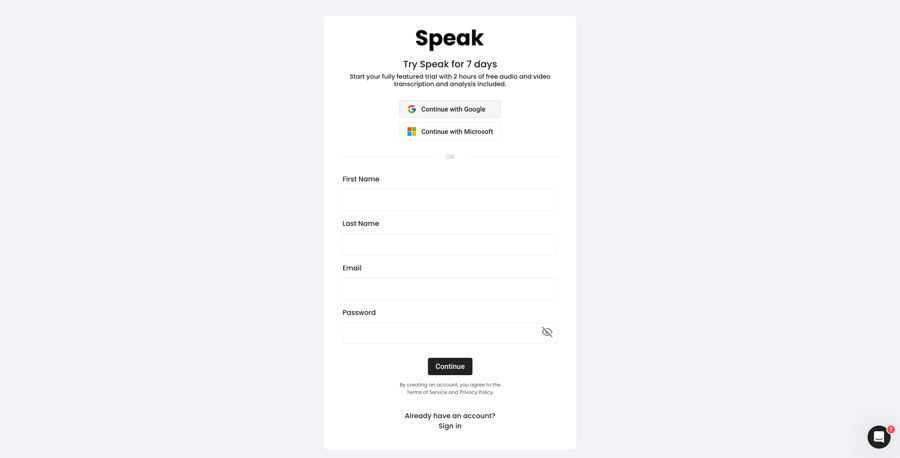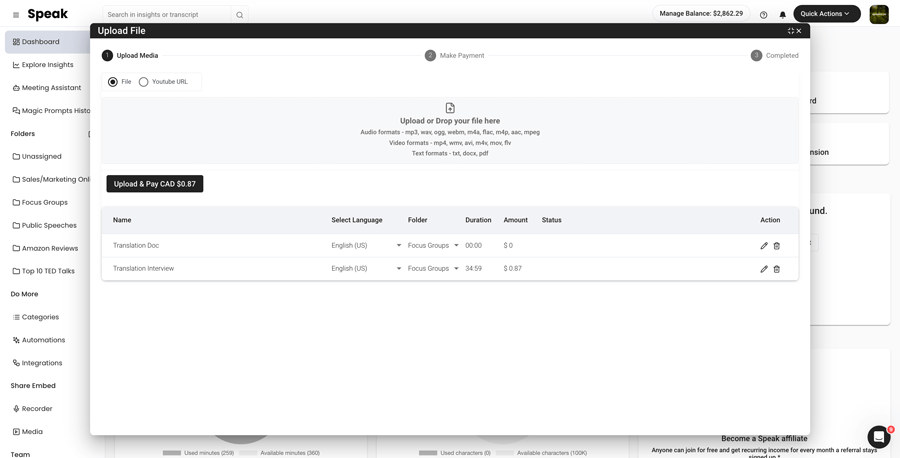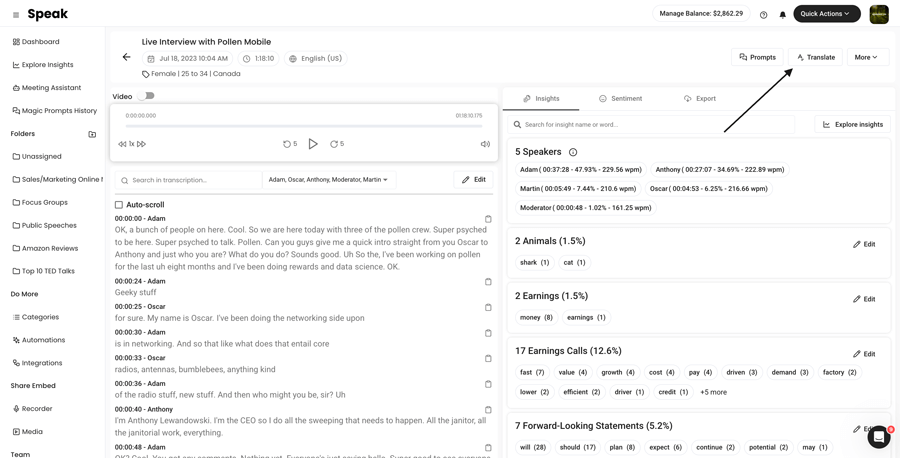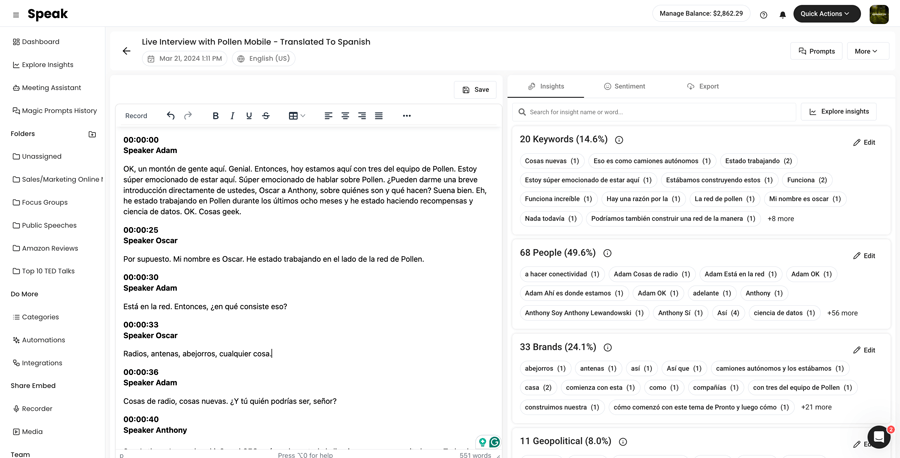How To Translate German to Lingala
Translating German to Lingala is super simple!

Step 1: Register for Speak
Register for Speak using this link.
Once you register, you can instantly begin translating your German to Lingala file(s).

Step 2: Upload Your German file(s)
As soon as you log in, you will be redirected to the dashboard.
Once there, you can select the Quick Action "New Upload".
In Speak, you can seamlessly upload, transcribe and translate audio, video and text files all at once!

Step 3: Translate Your German file(s) to Lingala
Once the file is uploaded, simply visit your file and select "Translate".
If it is an audio and video file, Speak will ask you if you want to keep the speaker names and timestamps in the translation.
Want to translate many files at once? No problem!
You can view the files you want to automatically translate from German to Lingala from the folder level and instantly translate as many files as you need with our artificial intelligence translation in just a few clicks.

Step 4: That's It! View, Analyze, Modify & Export Your New Lingala file(s)
Once the translation is done, you will be alerted and you will see a new document in the same folder your original file is in.
The file will be named the same but with a dash indicating that it is the translated version.
Need support with your German translation?
We are always here and happy to help at Speak!
Just send us a message on live chat on the bottom right corner and we will ensure you are set up for success.
Interested in translating German or other languages to different languages? View our entire list of supported translation languages here.
Automatic, accurate, instant AI translation from German to Lingala is here for you.
Register for Speak using this link and begin translating German to Lingala today.
The Revolutionary Impact of AI Translation: Bridging German and Lingala
In today's hyper-connected world, the ability to communicate across cultures and languages is more valuable than ever. With the rise of Artificial Intelligence (AI) translation services, barriers are being dismantled every day, making languages as diverse as German and Lingala accessible to everyone. Whether you're a researcher expanding your study's reach or a business looking to tap into new markets, the power of AI translation, especially from German to Lingala, offers unparalleled opportunities for growth, understanding, and connectivity.
Understanding the Demand: German and Lingala in the Global Scene
Where German and Lingala Thrive: Locations and Populations
German, with its rich history and economic prowess, is predominantly spoken in Germany, Austria, Switzerland, Luxembourg, and Liechtenstein. It boasts a population of over 100 million speakers worldwide. Lingala, on the other hand, while not as widespread, plays a crucial role in Central Africa, particularly in the Democratic Republic of the Congo and parts of the Republic of the Congo, serving as a lingua franca for over 45 million people.
The Historical Tapestry and Current Significance
Germany's influence on global science, literature, and philosophy is well-documented, making its language critical for researchers and scholars around the world. Lingala's significance, while different, is equally profound. Originating as a trade language, it has evolved into a cultural cornerstone for music, dance, and oral storytelling in Central Africa.
Delving Deeper: Fun Facts about German and Lingala
German Language Quirks
German is known for its notoriously long compound words, such as "Rechtsschutzversicherungsgesellschaften," meaning insurance companies providing legal protection. It also has three genders (masculine, feminine, and neutral), adding a layer of complexity for learners.
The Musicality of Lingala
Lingala's genesis from a trade pidgin to a fully-fledged language has made it incredibly versatile and musical, making it a popular language in Afrobeats and Congolese rumba.
Contrasts and Comparisons: German and Lingala Side by Side
Structural Differences
At a fundamental level, German and Lingala differ significantly in grammar and syntax. German syntax follows a relatively strict Subject-Verb-Object order and utilizes cases for noun phrases, which affects the word order. Lingala, conversely, is more flexible in sentence construction and relies heavily on tone for meaning.
Linguistic Similarities
Despite these differences, both languages share a focus on verb conjugation to express time and mood. Additionally, each language has absorbed words from other languages, reflecting their dynamic and evolving nature.
The Value of Translating German to Lingala: A Gateway to New Opportunities
Broadening Research Horizons
For scholars and academics, translating work from German to Lingala could open up new avenues for collaboration and education in Central Africa, particularly in areas where Lingala is a primary means of communication.
Expanding Business Frontiers
Businesses aiming to operate in or export to the Lingala-speaking regions can benefit significantly from AI translation tools. From localizing marketing materials to ensuring effective customer service, the ability to seamlessly translate between German and Lingala paves the way for unparalleled market access and consumer engagement.
Speak AI: Your Partner in German to Lingala Translation
At Speak AI, we're at the forefront of leveraging AI, NLP, and large language models to revolutionize translation processes. Our AI Meeting Assistant can join crucial discussions, providing real-time translation from German to Lingala and vice versa, ensuring clear, accurate communication.
Time and Cost Efficiency
By automating the translation between German and Lingala, businesses and researchers can save substantial amounts of time and money, allowing them to focus on core activities rather than the intricacies of cross-language communication.
Driving Sign-Ups and Revenue through Seamless Integration
With over 150K users and a 4.9 rating on G2, Speak AI is your ideal partner for navigating the complexities of German to Lingala translation. Discover how our AI-driven solutions can enhance your operations, research, and market reach. Sign up today and unlock the potential of automatic translation to transform your communication strategies.
Conclusion
Translating German to Lingala is no longer a daunting task with the advancements in AI and NLP technologies. Whether it's for broadening research or tapping into new markets, the possibilities are endless. Embrace the future of translation with Speak AI, and take the first step towards global connectivity and understanding.
---
FAQ: German and Lingala – Insights and Opportunities
What locations are German and Lingala popular?
German is widely spoken in Central Europe, especially in Germany, Austria, and Switzerland. Lingala is prevalent in the Democratic Republic of the Congo and the Republic of the Congo in Central Africa.
What are some fun facts about German and Lingala?
German is known for its long compound words and three genders. Lingala, known for its musicality, plays a significant role in Afrobeats and Congolese rumba.
What are the differences and similarities between German and Lingala?
German and Lingala differ greatly in syntax and grammar. Both languages, however, utilize verb conjugation to express time and mood, highlighting the dynamic nature of linguistic evolution.
Translate German To These Other Supported Languages:
- Translate German-to-Afrikaans
- Translate German-to-Albanian
- Translate German-to-Amharic
- Translate German-to-Arabic (Egypt)
- Translate German-to-Arabic (Iraq)
- Translate German-to-Arabic (Israel)
- Translate German-to-Arabic (Jordan)
- Translate German-to-Arabic (Kuwait)
- Translate German-to-Arabic (Lebanon)
- Translate German-to-Arabic (Oman)
- Translate German-to-Arabic (Palestinian Authority)
- Translate German-to-Arabic (Qatar)
- Translate German-to-Arabic (Saudi Arabia)
- Translate German-to-Arabic (Syrian Arab Republic)
- Translate German-to-Arabic (United Arab Emirates)
- Translate German-to-Arabic Modern Standard (Bahrain)
- Translate German-to-Armenian
- Translate German-to-Assamese
- Translate German-to-Aymara
- Translate German-to-Azerbaijani
- Translate German-to-Bambara
- Translate German-to-Basque
- Translate German-to-Belarusian
- Translate German-to-Bengali
- Translate German-to-Bhojpuri
- Translate German-to-Bosnian
- Translate German-to-Bulgarian
- Translate German-to-Catalan
- Translate German-to-Cebuano
- Translate German-to-Chinese (Simplified)
- Translate German-to-Chinese (Traditional)
- Translate German-to-Corsican
- Translate German-to-Croatian
- Translate German-to-Czech
- Translate German-to-Danish
- Translate German-to-Dari
- Translate German-to-Dhivehi
- Translate German-to-Dogri
- Translate German-to-Dutch
- Translate German-to-English
- Translate German-to-English (Australia)
- Translate German-to-English (Indian)
- Translate German-to-English (Irish)
- Translate German-to-English (New Zealand)
- Translate German-to-English (Scottish)
- Translate German-to-English (South African)
- Translate German-to-English (United Kingdom)
- Translate German-to-English (United States)
- Translate German-to-Esperanto
- Translate German-to-Estonian
- Translate German-to-Ewe
- Translate German-to-Farsi (Persian)
- Translate German-to-Filipino Tagalog
- Translate German-to-Finnish
- Translate German-to-French
- Translate German-to-French (Canada)
- Translate German-to-Frisian
- Translate German-to-Galician
- Translate German-to-Georgian
- Translate German-to-German
- Translate German-to-German (Swiss)
- Translate German-to-Greek
- Translate German-to-Guarani
- Translate German-to-Gujarati
- Translate German-to-Haitian Creole
- Translate German-to-Hausa
- Translate German-to-Hawaiian
- Translate German-to-Hebrew
- Translate German-to-Hindi
- Translate German-to-Hmong
- Translate German-to-Hungarian
- Translate German-to-Icelandic
- Translate German-to-Igbo
- Translate German-to-Ilocano
- Translate German-to-Indonesian
- Translate German-to-Irish
- Translate German-to-Italian
- Translate German-to-Japanese
- Translate German-to-Javanese
- Translate German-to-Kannada
- Translate German-to-Kazakh
- Translate German-to-Khmer
- Translate German-to-Kinyarwanda
- Translate German-to-Konkani
- Translate German-to-Korean
- Translate German-to-Krio
- Translate German-to-Kurdish
- Translate German-to-Kurdish (Sorani)
- Translate German-to-Kyrgyz
- Translate German-to-Lao
- Translate German-to-Latin
- Translate German-to-Latvian
- Translate German-to-Lingala
- Translate German-to-Lithuanian
- Translate German-to-Luganda
- Translate German-to-Luxembourgish
- Translate German-to-Macedonian
- Translate German-to-Maithili
- Translate German-to-Malagasy
- Translate German-to-Malay
- Translate German-to-Malayalam
- Translate German-to-Maltese
- Translate German-to-Maori
- Translate German-to-Marathi
- Translate German-to-Meiteilon (Manipuri)
- Translate German-to-Mizo
- Translate German-to-Mongolian
- Translate German-to-Myanmar (Burmese)
- Translate German-to-Nepali
- Translate German-to-Norwegian
- Translate German-to-Nyanja (Chichewa)
- Translate German-to-Odia (Oriya)
- Translate German-to-Oromo
- Translate German-to-Pashto
- Translate German-to-Persian
- Translate German-to-Polish
- Translate German-to-Portuguese
- Translate German-to-Portuguese (Brazilian)
- Translate German-to-Portuguese (Portugal)
- Translate German-to-Punjabi
- Translate German-to-Quechua
- Translate German-to-Romanian
- Translate German-to-Russian
- Translate German-to-Samoan
- Translate German-to-Sanskrit
- Translate German-to-Scots Gaelic
- Translate German-to-Sepedi
- Translate German-to-Serbian
- Translate German-to-Sesotho
- Translate German-to-Shona
- Translate German-to-Sindhi
- Translate German-to-Sinhala
- Translate German-to-Sinhala (Sinhalese)
- Translate German-to-Slovak
- Translate German-to-Slovenian
- Translate German-to-Somali
- Translate German-to-Spanish
- Translate German-to-Spanish (Mexico)
- Translate German-to-Sundanese
- Translate German-to-Swahili
- Translate German-to-Swedish
- Translate German-to-Tajik
- Translate German-to-Tamil
- Translate German-to-Tatar
- Translate German-to-Telugu
- Translate German-to-Thai
- Translate German-to-Tigrinya
- Translate German-to-Tsonga
- Translate German-to-Turkish
- Translate German-to-Turkmen
- Translate German-to-Twi (Akan)
- Translate German-to-Ukrainian
- Translate German-to-Urdu
- Translate German-to-Uyghur
- Translate German-to-Uzbek
- Translate German-to-Vietnamese
- Translate German-to-Welsh
- Translate German-to-Xhosa
- Translate German-to-Yiddish
- Translate German-to-Yoruba
- Translate German-to-Zulu



